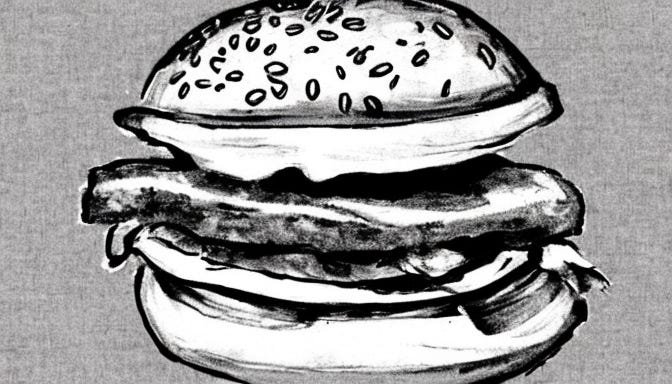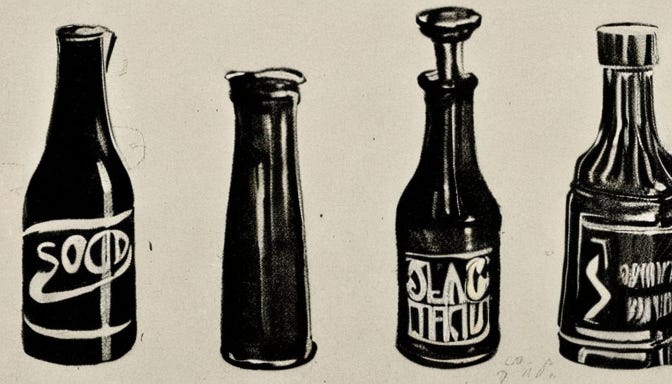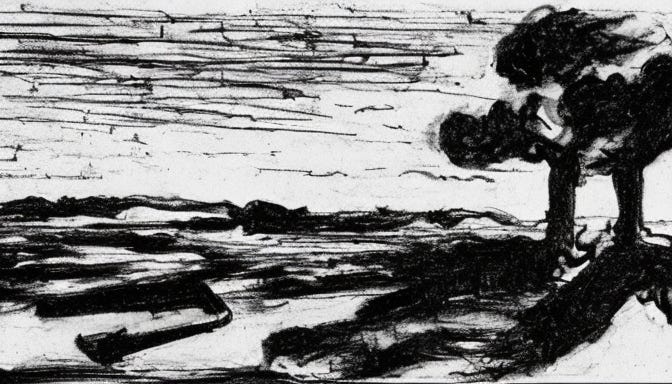New McSincerity
Kitsch is on the menu...
We’re thoroughly enthused to present a special missive from a scion of the golden arches themselves, Remember Summer Days, on the ever present threat of kitsch in pop culture. And would you like sincerity with that? Don’t grimace now, go ahead and pull up to the first paragraph, we’re ready to serve you!
Thanks!
New McSincerity
The night my uncle died, we rode back home in his Mercedes Benz. My uncle had treasured that car with his life, and he had left it parked in the hospital. He’d expected to return home after an overnight stay. I rested my head against the cold rear door window and gazed at the pristine neon signs that towered over the skyline, the warm glow of chain restaurant logos I’d known since childhood. As kids, my uncle took me and my sister to McDonald’s for dinner, afterwards we’d have a sleepover at his house and fall asleep next to him as a Dreamworks movie played. We realized in the car that night that we hadn’t eaten since breakfast. We knew what had to be done — we had to visit McDonald’s.
It’s likely that your first kiss was at an AMC theater, your last high school summer ended with a class trip to Disney World, and you used to hang out with your friends at McDonald's. Memories birth the self, but in the modern urban landscape corporate brands press a logo over every memory. And the owners know you've become affectionate to the brand itself, not because there's anything intrinsically special about their product, but because the brand has become part of your identity.
But a society of fully corporate colonized brains can cause some odd dynamics. On October 10th, 2023, McDonald's Japan released a one-minute animated ad portraying a wholesome, interracial family eating some Mac Fries, best captured in the image of a cute little girl bobbing her head and smiling at her loving parents. In this framing, McDonald's fries are a measure of true love.
This elicited unhinged reactions from all over the e-political spectrum and made a spectacle that disturbed the terminally online political mind. The right-wing wrestled with the anime question as they either praised or despaired over the ad. One side just thanked McDonald's for pissing off the “snowflakes” once again, ignoring western McDonald's earlier promotions of trans lesbians; McDonald’s Japan was now suddenly connected with the ancient Western tradition of portraying the hetero family as something good, true, and marketable.
Others on the right were in pure despair. Seeing in the ad a totem of what they cannot hope to achieve, what society once promised them but is now too broken to deliver. A young man married to a beautiful woman, able to afford a daughter and take the whole family to McDonald's. Just like in the 1950s! Young men saw in the ad a mirror of their desires, and that hideous beauty only reminded them of what they may never have.
Meanwhile the left claimed the ideals of family formation themselves present an oppressive standard for a liberated human being. To them the ad commodified and prescribed what a family should be, repressive ideas carried as relics from the Eisenhower era, the same old sleight of hand of portraying capitalistic consumption as something liberating—don’t you kids know there’s no ethical consumption under capitalism? They felt a different despair, that of heteronormative oppression creeping nearer, latent bigotry rising in a brand of familiar comfort: Right wing values shoved into progressive McDonald's.
The ad struck a nerve and exposed the hypocrisy of both sides. Despite our professed differences we are united by at least one commonality: to live in modernity is to have your memories chained to some corporate IP or another, to have your most soulful nostalgia always rest under the shadow of shallow corporate advertisement.
Sincerity and Kitsch
To live in the present is to consume, take part, and reciprocate advertisements. Corporate advertisement, as soulless as Cronus devouring its children, is the antithesis of art. Not because it’s postmodern or grotesque, but because it’s kitsch. Kitsch is the opposite of art because it is a calculated false religion, and to live in modern society is to indulge in kitsch.
Conservative philosopher Roger Scruton explains the religious features of kitsch:
“Indeed kitsch, as I see it, is a religious phenomenon – an attempt to disguise the loss of faith, by filling the world with fake emotions, fake morality and fake aesthetic values. The loss of faith which has infected popular culture has infected modernism too.”
Kitsch is an aesthetic that pretends to be sublime by rewarding you with sentimentality. It masquerades as a superficial understanding of humanity by giving you a maudlin image. In the philosophy of art, the definition of kitsch is a contentious issue; however, it’s something we all recognize when we see it. Think of socialist realism paintings, Coca-Cola Christmas paintings, or a Thomas Kinkade Disney painting. The problem with all these works is that they are a work of fantasy rather than imagination.
Roger Scruton, again, explains the pollution that sentimentality brings to art: "Cliché and sentimentality are often mistaken for a sincere expression. By allowing this to take place, cliché impoverishes the emotional life of those who are drawn to it."
Scruton later elaborates, using the example of the erotic desire in painting:
“The girl in the erotic painting is not the object of my desire, but only of imaginary desires in an imaginary world. And in that world she is real and resistant, as much a person as any other, whose sexual favors must be purchased by risk, adventure and respect. Erotic art aims to prompt not real desire but a meditative sympathy with the desires of imagined beings... But although imagination is, in this way, informed by a sense of reality, it need not represent the world as it is. On the contrary – the imagination idealizes, ennobles, embellishes and re-presents the world.”
By being a slave to surrogate desires, fantasy destroys the ennobling imagination of art. This is where we come back to our McDonald’s meme. The left-wing critique is quite accurate in this case: the ad is one of the most reprehensible examples of modern kitsch. If you hold the family unit as sacred then you shouldn’t be open to its commodification, either by 1950s paintings or 2020s McDonald's ads. And yet those who most wish to champion family values are the most likely to be seduced by its kitsch manifestations.
But what can we do? Kitsch is inescapable, the modern religion of popular aesthetics. Romantic art attempted to re-enchant the world through ennobling human emotion. Yet, romantic art couldn’t survive the age of mass production, and so romantic emotions became a disposable product through advertisement. Kitsch arises when a society desires the virtues of a higher, more enchanted life, but it is too alienated from its virtues and too comfortable with its (post) modernist vices to pursue them. Thus kitsch comes to fill this pretension of ennobling the spirit through the cheap and mass-produced.
Viewed through this lens, it is perhaps not surprising how eager the online right is to engage with kitsch in its many incarnations — my little pony bros, trad moe waifus, 1950s Americana, or McDonald's commercials.
But perhaps this retreat into kitsch is understandable when we look at the rest of the artistic landscape. Postmodern literature like Gravity’s Rainbow has made a concerted effort to blur the lines between high and low culture. With books like Infinite Jest indulging this view while ironically criticizing it. Middle-brow pop culture like Breaking Bad, Arcane, or Toradora have made it difficult for young people to distinguish the sublime and the humane from the sentimental and self-indulgent. Never before has mass production made dehumanization easier. The duty to overcome kitsch is challenging, but there are victories.
When I first read Blood Meridian, I thought the book was written around the mid-1800s. I was shocked when I found out the book came out in the 80s. I couldn’t believe a novel that felt so true and atavistic was written just before Regan’s America. Blood Meridian ends with the Devil towering over mankind, and then an epilogue as ambiguous as the book of Revelation. Maybe the epilogue describes the building of a railroad, the instrument of the gulags and the holocaust, or maybe it describes an artist planting lighting roads for others to follow in his footsteps. Against the horrific visions of modernity, there remains a light to follow.
Once touched by the enchantment of his muse, the artist can meet the sublime vision that inspired his predecessors to compose the works that built human culture. Yes, we may be forever corrupted by kitsch, but when sojourning in the sublime, we work to make a gift to humanity, to future generations whose names are yet unknown. A work of art whose significance may be unknown even to you, but it will reach those who need it the most and enchant their lives with an eternal vision.
Perhaps someday we will move beyond the empty reheated calories of self-referential nostalgia and we will have no more need for a comfort meal at McDonald's. And on that day parents will serve their children a more nutritious meal and tell them the story of how embarrassingly kitschy things used to be.
Check out Remember Summer Days on Substack








Agreed! Very grateful to Summer for sharing.
Summer did a fantastic job with this piece